The phone rang at the family home in Hepworth, near Huddersfield, during the early hours of July 15, 2001. Joan Falconio answered it, eager for news from her second-youngest son, Peter, who was travelling in Australia with his girlfriend, Joanne Lees.
They’d spoken two days previously when the pair were in Alice Springs, a remote Outback town.
‘We had a lovely talk together; he was laughing and joking – making plans as he always did,’ she recalled. ‘Joanne was beside him and I could hear her laughing. They sounded so happy.’
But it wasn’t Peter on the line. It was the Australian police.
Two English backpackers had been ambushed on a highway near a place called Barrow Creek. The male was 28; the female 27. She had been tied up but escaped and was found alive. He had been shot and was missing, presumed dead.
‘I knew Peter and Joanne were on that road but didn’t want to believe it was them,’ Joan, now 78, would later say.
‘I prayed it wasn’t. Two hours later, the phone rang again – it was them. Peter was gone. There was a pool of blood on the road. I fell to my knees.’
Peter Falconio’s murder sent shockwaves around the world.
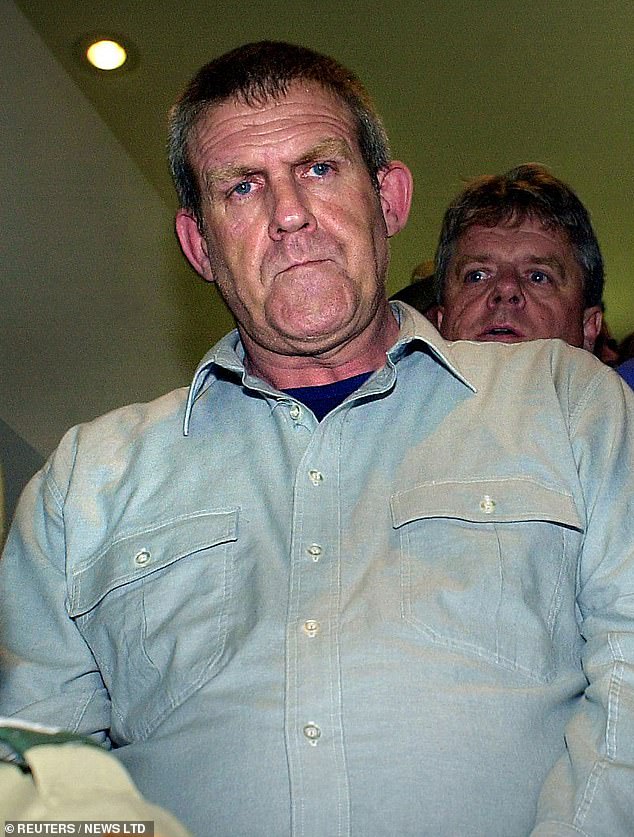
Bradley Murdoch was first identified as the prime suspect in Peter’s murder when DNA evidence linked him to the scene
Here was an ordinary young British backpacker, supposedly on an adventure of a lifetime thousands of miles away from home, who had been snatched by a stranger and brutally killed in cold blood.
But what ensued was even more agonising for his parents, Joan and Luciano. For not only would their Peter never come home, but there was no trace of his body.
Rigorous police searches started, scouring barren scrubland around the Stuart Highway, south of Darwin, in the searing Australian heat – but to no avail.
It would be another four agonising years before Bradley John Murdoch, a mechanic and drug smuggler with a chain of previous convictions, was finally arrested and tried for murdering Peter and the attempted kidnap of his girlfriend, Joanne.
This, the Falconio family hoped, was it – they would finally find out what happened and get the chance to bring him home to Yorkshire.
But Murdoch, who was sentenced to life imprisonment with a minimum of 28 years in December 2005, pleaded not guilty at his trial – and refused to reveal what he did with Peter’s body.
For 20 long years, the Falconios have been waiting, desperately hoping that he might change his mind and tell them the truth. Now, however, they know that will never come to pass.
For Murdoch, who died on Tuesday aged 67, has taken his cruel secret to his grave.
The killer, who had terminal throat cancer, had last month been moved from the Alice Springs Correctional Centre to a nearby hospital, where his condition deteriorated over several weeks.
There, he became an emaciated shell of his hulking former self, confined to a wheelchair and drifting in and out of consciousness.
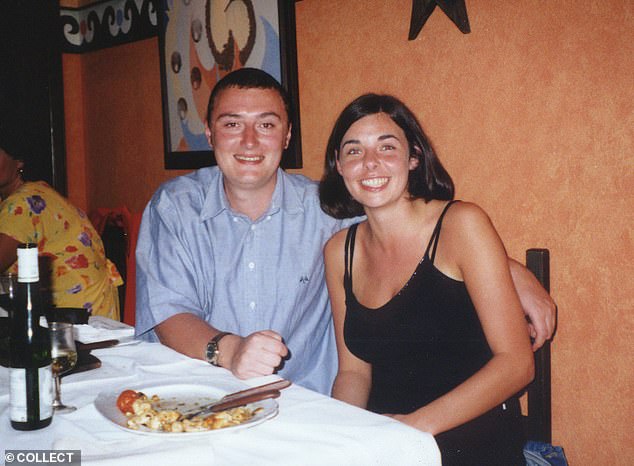
Peter Falconio and his girlfriend, Joanne Lees, had been ambushed on a highway in the Australian Outback in 2001
Speaking exclusively to the Mail yesterday, Peter’s father said the family preferred not to think about their son’s killer. ‘He’s not a good person,’ said the former postmaster, now 83. ‘He’s cruel, he’s a coward and we feel no sadness for him.’
He added: ‘He should have admitted his crime. He is the only one who knows where my son is. I don’t think he shared anything with Australian police but he
may have told someone – I really hope he has. I am in pain for my wife. I hope I find my son, for both of us… We need an end while we are still here.’
He added: ‘I don’t wish anybody dead because you have only got one life. I’ll tell you what I think, I wish [Murdoch] left something to help me find [Peter].’
Luciano is not the only one who had been hoping for answers. Police in Australia’s Northern Territory had repeatedly tried to speak to Murdoch in the weeks before his death, with no success.
In a bid for fresh information, officials even issued a new reward for tips, offering A$500,000 (£240,000) to anyone who could lead officials to Peter’s remains.
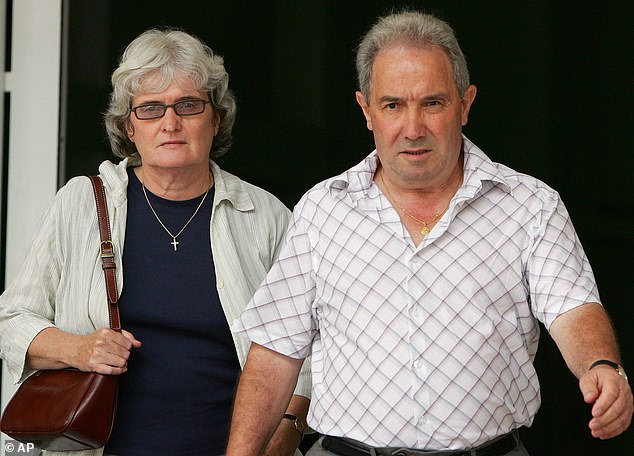
Joan and Luciano Falconio at the trial of Bradley Murdoch in 2005. All they have ever wanted to do is bring their son home – off that lonely road in Australia and back to Huddersfield where he belongs
‘It is deeply regrettable that Murdoch has died without, as far as we are aware, ever disclosing the location of Peter Falconio’s remains,’ a police spokesman said yesterday. ‘His silence has denied the Falconio family the closure they have so long deserved.’
It had been rumoured recently that a ‘deathbed confession’ might be on the cards. Robin Bowles, an Australian true crime author who interviewed Murdoch for a book in 2022, claimed he was planning on making an ‘explosive’ revelation in his final days.
What he might have been planning to say, or if he did divulge anything before taking his final breath, is not clear.
But the Mail can reveal his mind had been on other things. Rather than thinking of Joan and Luciano, and the son he brutally took from them, his focus was on his own son – with whom we can exclusively reveal he had reconnected after years of estrangement. The son, aged 40, had been visiting his father on his deathbed since they made contact last year.
Murdoch married the boy’s mother, Dianne, in July 1984. They had their only son before separating in 1986, reportedly because Murdoch was violent towards her.
In recent weeks, father and son were said to be enjoying spending their final time together. Murdoch, who died on the palliative care wing at Alice Springs Hospital, had also been allowed to leave the hospital while escorted around the Outback town – a move that raised eyebrows, given his refusal to divulge the location of Peter’s remains.
Under the Northern Territory’s ‘no body, no parole’ law, passed in 2016, authorities had promised the Falconios he would never walk free. Had he not fallen ill, he wouldn’t have been eligible for parole until 2032.
The Mail can reveal his final days were far more lenient than his time in Holtze Prison,
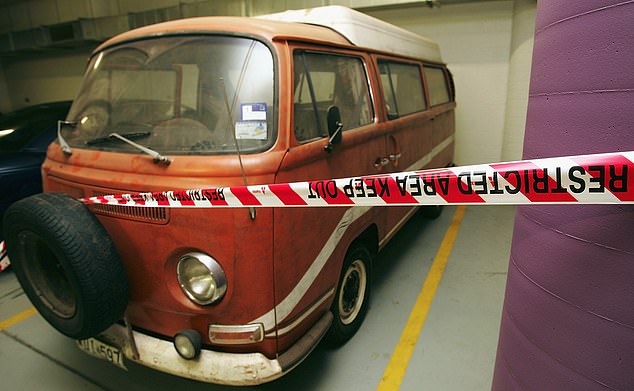
The young couple were travelling in their orange VW Kombi van along the Stuart Highway, heading for the Devil’s Marbles – a scenic conservation site – when they were ambushed
Darwin, where he was once under maximum security with other notorious felons, killers and child sex offenders.
He was moved several times during his incarceration, with authorities deliberately trying to break any sense of familiar routine so he could never get too ‘settled’. A source told the Mail the constant upheaval was because he was a ‘master manipulator’ – and authorities feared he might take advantage of others and find a way to escape. ‘People got to like him,’ the source says. ‘He got on well with anyone.’
Known for his handyman skills, he earned a reputation as a compliant, polite prisoner with few misconduct or disciplinary breaches. ‘He [could] fix anything, which made him very popular in the workshops of every jail he went to,’ the Mail’s contact reveals.
News of Murdoch’s popularity behind bars will be yet another blow to the Falconio family, who revealed last month they had not been informed about his cancer diagnosis, instead learning about it from media reports.
Ever since the criminal was first identified as the prime suspect in Peter’s murder, when DNA evidence linked him to the scene, Murdoch’s name – and his refusal to reveal what happened that fateful day – cast a shadow over the Falconios’ grief.
They had, as any parents might, harboured their own worries about Peter and Joanne’s big adventure around Asia, America and Australia when they set off in November 2000.
Australia is, after all, more than 9,000 miles from Huddersfield, and there were all sorts of stories about backpackers meeting grisly ends in the remotest stretches of the Outback.
But never in their worst nightmares did they imagine the fate that would befall Peter and Joanne. The pair met in a Huddersfield nightclub in 1996 and both moved to Hove, near Brighton, in 1998. Peter was studying for a building construction management degree at Brighton University, while Joanne worked as a travel agent.
They saved for months for their 12-month trip abroad, taking in Nepal, Singapore, Malaysia, Thailand and Cambodia before arriving in Sydney on a working visa in January 2001.
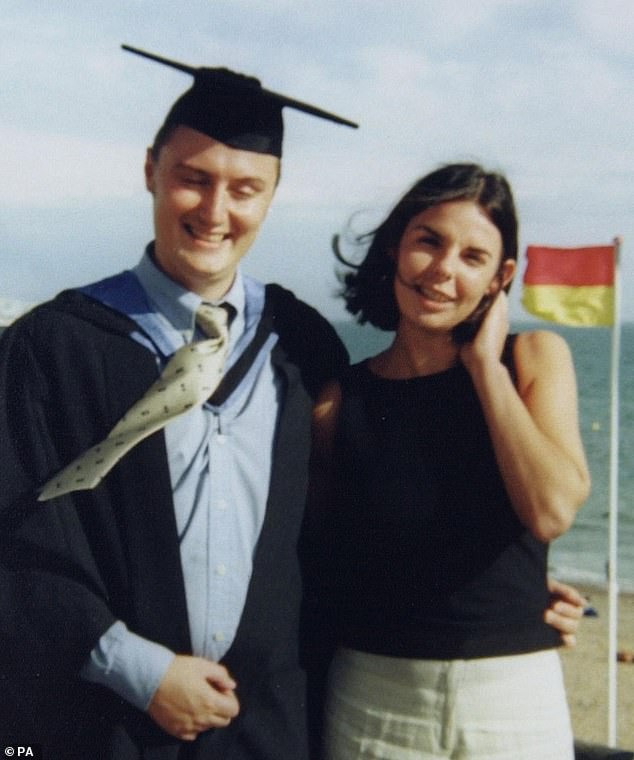
Peter and Joanne, who has spoken about her traumatic experience only on a handful of occasions. Now in her 50s, she is reportedly something of a recluse. She has never married nor had a family of her own
Despite his love of adventure, Peter was a homebird. He visited his parents most weekends, and his three brothers – Paul, Nicholas and Mark – all lived within two miles of the family home.
When abroad, he called home every few days; the only time he hadn’t in the past was when he was trekking in the Himalayas.
And so, travelling in their orange VW Kombi van along the Stuart Highway, heading for the Devil’s Marbles – a scenic conservation site northwards towards Darwin – a pit stop at a phone box would no doubt have been on the agenda.
But they never made it that far.
Around 7.30pm on Saturday, July 14, they spotted a white Toyota blinking its hazard lights at them from behind. They duly pulled over to the side of the road.
According to testimony from Joanne, the driver – now known to be Murdoch – told them sparks were coming out of their exhaust, and coaxed Peter round to the rear of the van.
She moved into the driver’s seat, ready to rev the engine, but heard a shot. Then, Murdoch appeared at the front of the van and threatened her with a handgun.
He cable-tied her hands and dragged her into the back of his Toyota. She managed to escape while he was distracted, hiding in bushland for five hours until she flagged down a truck driver, who took her to safety, at 12.35am.
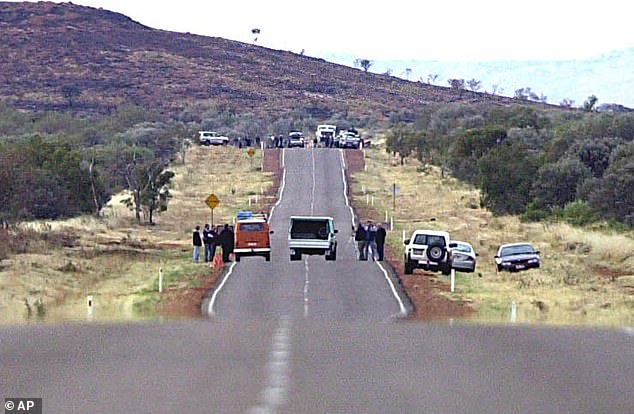
Police investigate the sight of the ambush, with the couple’s orange VW Kombi van seen at the side of the road, just as they left it that night
After Peter’s disappearance, conspiracy theories raged – including one which painted Joanne as a suspect, and another suggesting Peter had faked his own death and was in fact alive.
The case – the subject of countless documentaries, podcasts and films – became one of the most notorious mysteries in British and Australian criminal history.
With no body and no other witnesses, all police had to go on was a pool of blood and traces of DNA found on Joanne’s T-shirt, the cable ties and the gear stick of their camper van.
Police posted a A$250,000 (£125,000) reward, but hopes of finding Peter without the killer were slim: the area being searched is twice the size of France.
It wasn’t until August 2002, 13 months later, that Murdoch, who had been arrested by South Australia Police for the suspected rape and abduction of a woman and her 12-year-old daughter, was finally brought into custody.
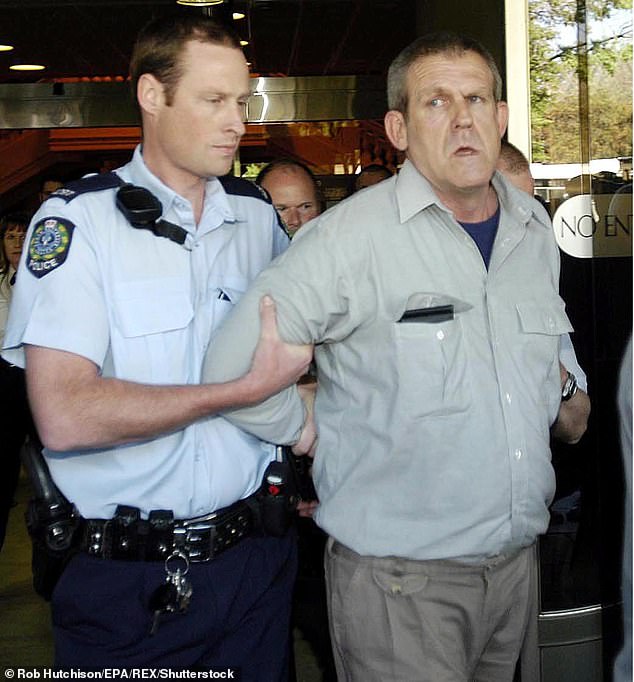
Two years after the ambush, Murdoch was arrested for Peter’s murder after he left court where he had been acquitted of sex offences
A DNA sample from his brother, Gary, matched with the murder scene. Joanne identified him as the man who tried to abduct her, and he was also confirmed using CCTV footage from a service station in Alice Springs. Later, one of Joanne’s hair ties was found among his belongings – presumably a trophy taken from his intended victim. When shown it in court, he visibly recoiled.
Joanne has spoken about her traumatic experience only on a handful of occasions. She was famously interviewed by Martin Bashir in 2002, followed by a few brief press appearances around the publication of her 2006 autobiographical book, No Turning Back.
Today, she is believed to be leading a low-key life back in her hometown of Huddersfield, where she was most recently employed as a social worker. Now in her 50s, she is reportedly something of a recluse. She has never married nor had a family of her own.
For years, the Falconios were close to Joanne, protesting her innocence and comparing her to a ‘daughter’. ‘We still see her but our conversations remain private,’ Peter’s mother said in 2020.
It is, in many ways, astonishing that in the two decades since Murdoch was convicted, police are no closer to finding Peter’s remains.
A well at a cattle station close to where he was shot was searched in 2014 and 2019, at the behest of his mother, but nothing was found despite a five-day operation.
In 2017, an anonymous letter sent to a Darwin newspaper claimed Peter’s body had been cut up and placed in bin bags, which were given to an associate of Murdoch’s to dissolve in acid and dispose of in a river in Perth. The letter claimed the associate ignored the instructions and buried the bags, unopened, in a remote part of Western Australia instead.
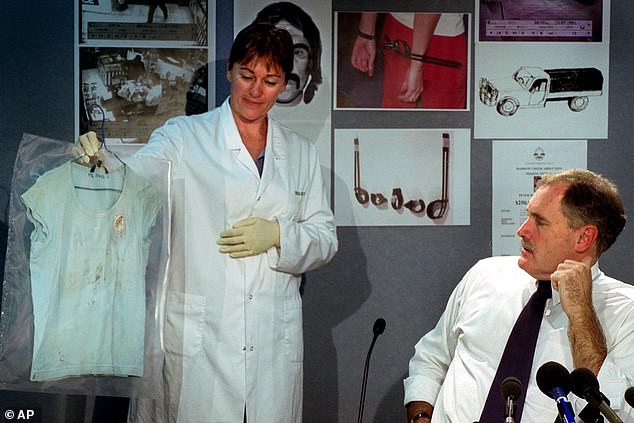
Senior police biologist Kamen Eckoff with the T-shirt Joanne wore on the night Peter was abducted in2001
Some have suggested that, in the grip of a debilitating illness, Murdoch himself may have forgotten the precise whereabouts of his victim. Whatever the truth, Peter’s killer’s heartless silence caused untold pain and suffering to the Falconio family.
Though Joan and Luciano, with two of their sons, travelled to Australia for Murdoch’s trial in 2005, ill health has prevented them from returning in recent years. Their youngest son has never been.
In a poignant statement read in court, Joan spoke of her ‘torment and constant physical pain’ after losing Peter. At times, she feared her marriage would collapse and her family would be torn apart. She developed awful anxiety attacks, constantly having to see or check on her three surviving sons to ensure they were safe.
‘The pain will never go from me,’ she said. ‘I think of Peter every minute of every day.’ His life, she added, had ‘stopped on a lonely road’. ‘He was only 28 years old and had so much living left to do.’
As the anniversary of their beloved son’s disappearance passes once again, Joan and Luciano will have him on their minds more than ever.
All they have ever wanted is to bring him home – off that lonely road and back to Huddersfield where he belongs.
It seems a cruel twist of fate that this, too, is the week the one man who could have alleviated their pain has died, taking his darkest secret with him.











